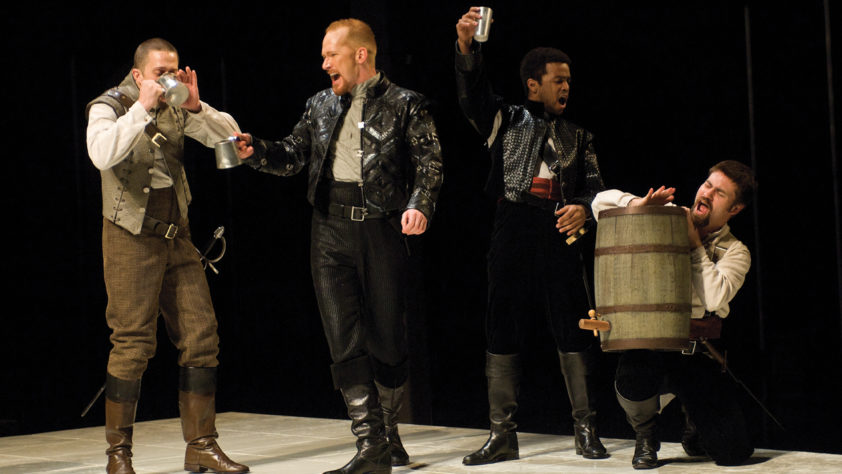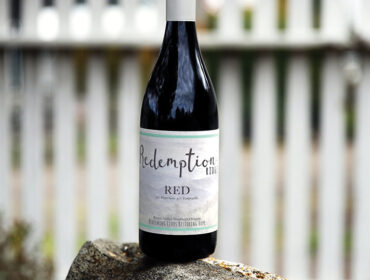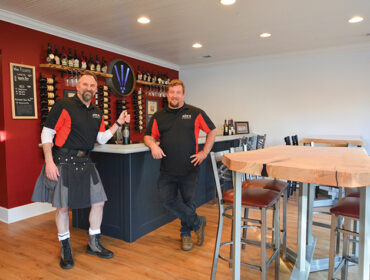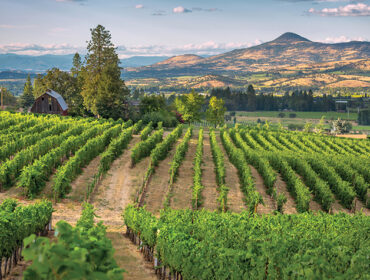
Vintage Shakespeare: William Weaves Wine & Wit – by Rhonda Nowak
“Crush a cup of wine”
“My master is the great rich Capulet; and if you be not of the house of Montagues, I pray, come and crush
a cup of wine. Rest you merry!” ~ Servant in Romeo and Juliet, Act I, Scene 2
A servant encounters Romeo and his cousin, Benvolio, on the streets of Verona, Italy, and invites them to a masked ball that evening at the house of Capulet. In those days, “crush a cup of wine” was a common phrase for “let’s party!”
The two young men can’t resist the offer of a good time even though Romeo is, indeed, the son of Capulet’s arch enemy, Montague. At the ball, Romeo encounters Juliet, his “heart’s dear love,” and, perhaps emboldened by wine, he kisses her shortly after they meet.
This festive scene begins one of the most famous love stories of all time. Of course, we know their brief romance ends tragically when Romeo mistakenly believes Juliet is dead and drinks from a cup of poison. If only he would stick to drinking wine, the couple might live happily ever after!
Romeo and Juliet is not the only play in which Shakespeare uses wine (or poisonous potions) as a clever plot device. In fact, the Bard mentions wine more than 100 times in 26 of 39 plays that are attributed to him. William’s drinking habits are a mystery, as is most of his life aside from writing plays and poetry. But with so many mentions of wine throughout his work, surely Shakespeare took to heart the observation of Pliny the Elder, a philosopher and commander of the early Roman Empire who wrote in the first century A.D.: “in vino veritas” (“in wine there is truth”).
In fact, vino plays a role in all four of the performances from Shakespeare’s canon during the 2018 season of the Oregon Shakespeare Festival. Othello kicked-off the season on February 16 and runs through October 28 in the Angus Bowmer Theatre. Henry V plays through October 27 in the Thomas Theatre. Summer performances in the outdoor Allen Elizabethan Theatre include Romeo and Juliet, June 5-October 12, and Love’s Labor’s Lost, June 7-October 14. Tickets for all 11 of this season’s OSF plays are available online at www.osfashland.org.
When experiencing this year’s selection of Shakespeare’s tragedies, history, and comedy plays, theatergoers will mind-travel to the places Shakespeare’s stories are set. Romeo and Juliet fall in love in Verona, Italy; Othello and Desdemona fall apart on the island of Cyprus. In Henry V, the Duke of Burgundy makes an impassioned plea for peace from King Charles’ palace in France; and in Love’s Labor’s Lost, everyone enjoys a day in the park at King Ferdinand’s palace in the Kingdom of Navarre, set between France and Spain.
Intriguingly, Shakespeare’s stories are set in places that have famous wines. For example, the ancient Greeks called Romeo and Juliet’s Italy “Enotria,” land of wine; indeed, the Romans were the first viticulturists to understand the importance of terroir to winemaking. They were pioneers in matching specific grape varieties to particular regions in Italy.
Today, the picturesque city of Verona is part of the Veneto region in northeast Italy where three widely exported wines are produced: Soave, a white wine made from Garganega grapes; Valpolicella, a light red made from Corvina, Molinara and Rondinella grapes; and Bardolino, a red blend made from the same grapes used for Valpolicella with other varieties.
One of the most famous wines of the Veneto region is Amarone of Valpolicella, a vibrant red produced with grapes that are left to raisin on the vine for up to four months in order to maximize the concentration of sugar and spicy aromas.
We’ll never know if Shakespeare imagined Romeo and Juliet toasting their brand-new love with a cup of Amarone, but the townspeople of Verona know a good story when they hear one. Today, a house that is said to be built from the foundation of the house of Capulet, now called Casa di Giulietta, boasts the most famous balcony in the world. Every day, couples of all ages and nationalities toast their eternal love beneath the balcony, paying homage to Shakespeare, romance—and wine.
“Have a stoup of wine”
The first act of Othello is set close to Verona in Venice, Italy, but most of the drama unfolds on the island of Cyprus in the Eastern Mediterranean.
Othello has often been called one of Shakespeare’s most intimate romantic tragedies. Just like Romeo and Juliet, the passionate love shared by Othello and Desdemona is doomed by social pressures. Whereas Romeo and Juliet are kept apart by their family feud (and a cup of poison), Othello and his lady love are thwarted on multiple fronts.
To begin with, Othello is a black, Muslim soldier who, despite his reputation as a heroic warrior for Venice, confronts prejudice and bigotry from Desdemona’s family after the couple elopes. Even one of his closest officers, Iago, delights in making racial slurs behind Othello’s back. In fact, Iago is obsessed with bringing Othello down by any means.
“Come, lieutenant, I have a stoup of wine; and here without are a brace of Cyprus gallants that would fain have a measure to the health of black Othello.” ~ Iago in Othello, Act II, Scene 3
Enter a stoup, or jug, of wine that Iago offers to Othello’s lieutenant, Cassio, with evil intent. “If I can fasten but one cup upon him… he’ll be as full of quarrel and offence as my young mistress’s dog,” Iago reveals to the audience after Cassio has admitted his “very poor and unhappy brains for drinking.” Iago’s malicious plan is for Cassio to disgrace himself in front of Othello, and then Iago can convince Othello that the unworthy Cassio and Desdemona are fooling around.
Iago’s complicated plan actually works because he is so wickedly brilliant at finding everyone’s weak spot. As it turns out, Othello’s Achilles heel is the “green-eyed monster” that lurks beneath his calm, self-assured demeanor. Iago chips away relentlessly at Othello’s trust in Desdemona’s faithfulness, until finally Othello’s jealousy leads to a tragic ending in which both lovers share Romeo and Juliet’s fate, except without the poison.
In Othello, things might turn out better if Cassio did not drink the wine Iago offers to him. Then again, Cassio is the only one out of the four key characters still alive at the end of the play, so things actually turn out relatively well for him.
Iago tells Cassio that “good wine is a good familiar creature,” and that is certainly the case for Cypriot wines, which are considered some of the oldest wines of the world. The most famous and oldest named wine still in production is Commandaria, an amber dessert wine made from Mavro blue grapes and white xynisteri grapes. The grapes are picked slightly over-ripe for their sweetness, and then undergo a slow fermentation and aging process. The result is a rich, caramel aroma that is deliciously paired with after-dinner chocolate.
Commandaria got its name from the Knights Templar who settled on Cyprus after King Richard the Lionhearted conquered the island in the 12th century. Legend has it that Commandaria was served at King Richard’s wedding to Princess Berengaria of Navarre in 1191, and there Richard proclaimed Commandaria “the wine of kings and the king of wines!”
The knights made and exported large quantities of Cypriot wine to the royal courts of Europe, including the court of King Henry III who is credited for hosting the first-ever wine-tasting event in 1224. A Commandaria wine imported from Cyprus won first place.
“Her vine, the merry cheerer of the heart”
Nearly 200 years later, in Shakespeare’s History of Henry V, the English monarch seriously upsets the oak barrel in France when his army ends up victorious in the battle at Agincourt and Henry proclaims himself King of France.
Of course, this doesn’t sit well with King Charles VI, who may be more concerned about the loss of his French vineyards than with Henry’s demand to marry his daughter, Princess Catherine, as one of the terms of the peace treaty. However, Charles’ uncle, the Duke of Burgundy, pleads for peace between England and France:
“Why that the naked, poor and mangled Peace, dear nurse of arts and joyful births, should not in this best garden of the world, our fertile France, put up her lovely visage? Alas, she hath from France too long been chased…” ~ The Duke of Burgundy in Henry V,Act V, Scene 2
The Duke continues his 45-line speech before King Henry, King Charles and Queen Isabel by comparing the unrest in France to an untended vineyard:
“Her vine, the merry cheerer of the heart, unpruned dies…And as our vineyards, fallows, meads and hedges, defective in their natures, grow to wildness, even so our houses and ourselves and children have lost, or do not learn for want of time, the sciences that should become our country; but grow like savages…”
In the end, King Henry has his way with France and Princess Catherine. Of course, it all comes apart later during the reign of Henry VI; however, at the end of Henry V, peace is negotiated and the vineyards of France (although under English rule) are kept tidy and productive.
In fact, over the centuries, the Burgundy wine region in eastern France has become famous for producing world-class Pinot Noir and Chardonnay grapes and wines. The red and white Burgundy wines are widely acclaimed for the exceptionally high-quality terroir of the region and its unique effect on the aroma and flavor of the wines made there.
Today, Burgundy vineyards are classified by four levels, depending on how exceptional the plot of land is considered to be for growing Pinot Noir and Chardonnay grapes: Grand Cru (2 percent of all wines produced in the region); Premier Cru (12 percent); Village wines (36 percent); and the rest are Regional wines made from a variety of Village vineyards.
“If you grow so nice”
The OSF’s production of Love’s Labor’s Lost opens in early June, a fitting time as the entire play is set in the King of Navarre’s park. The comedic events unfold as King Ferdinand and his three attending lords, Berowne, Longueville and Dumain, first make a pact not to get involved with women and then all promptly, but secretly, break the agreement upon the arrival of the Princess of France and her three ladies-in-waiting, Rosaline, Catherine and Maria.
Love’s Labor’s Lost is known as the first of Shakespeare’s lyrical plays because more than 60 percent of the lines are rhymed, and the dialogue is loaded with the Bard’s witty language play.
Indeed, games play a prominent role in Love’s Labor’s Lost, with the characters dressing up as someone else and playing games of dice. During the last, long scene, Lord Berowne, impersonating a “frozen Muscovite,” thinks he’s playing a game of dice with his “secret” love, Rosaline, but it’s really the disguised Princess of France who is sparring with him, using both dice and double-entendres.
Lord Berowne asks for “one sweet word” with Rosaline-actually-the-Princess, to which she cleverly replies: “Honey, and milk, and sugar; there is three” (sweet words). But Berowne is witty with words, too:
“Nay then, two treys, and if you grow so nice,Metheglin, wort, and malmsey: well run, dice! There’s half-a-dozen sweets.”~ Berowne in Love’s Labor’s Lost, Act V, Scene 2
Berowne is saying he’s rolled two threes with the dice, and if Rosaline-actually-the Princess is shy about giving him her favors, perhaps some alcoholic beverages will sweeten her up a bit.
He mentions three sweet drinks by name. Metheglin, also called mead, was a mixture of fermented honey and water, popular during the Elizabethan period because it was homemade. Most people in Shakespeare’s day could not afford imported wines, which cost up to 12 times more than ale. Berowne also mentions wort, a sweet unfermented beer, and malmsey, a sweet wine made from Malvasia grapes.
The English imported large quantities of malmsey wine from Portugal and Spain. We know it today as Madeira, named after the island in Portugal where the wine is still produced. Malvasia grapes are grown in the warmest coastal regions of Madeira.
As the name of the play suggests, Berowne’s labors of love for Rosaline are ultimately lost, as are the hopes of his lordly comrades and King Ferdinand, when all of the women return to France with only vague promises for the future. Alas, the men are left with only their jugs of sweet wine to console themselves.
Whether making a quick cameo appearance in Love’s Labor’s Lost and Romeo and Juliet, or playing more substantial parts in Henry V and Othello, wine takes on a full complement of roles in OSF’s 2018 season. Scheming Iago is undoubtedly a bad guy in Othello, but he makes a lot of good sense when he sings to Cassio, “A life’s but a span; why then… let’s drink some wine!” Rest you merry!
Featured image is Othello (2008): Danforth Comins, Dan Donohue, Edgar Sanchez, B. Trevor Hill. Photo by Jenny Graham.
![Garza_Derek_2018[1]](https://southernoregonwinescene.com/wp-content/uploads/2018/03/Garza_Derek_20181.jpg) “CASSIO” IS ACTUALLY AN OENOPHILE!
“CASSIO” IS ACTUALLY AN OENOPHILE!
The tragedy part of Othello really begins in scene three when sneaky Iago sings his way into Cassio’s head, leading him to overindulge in the specialty of the house on the island of Cyprus: sweet Commandaria wine.
Just like Iago figures will happen, Cassio gets into a loud fight, which disturbs Othello from his lovemaking with Desdemona so he fires Cassio. One thing leads to another, all villainously orchestrated by Iago, until nearly everyone is dead when the final curtain closes.
Except Cassio. He’s still alive, but his reputation is in tatters and this is important to him. He curses: “O thou invisible spirit of wine, if thou hast no name to be known by, let us call thee devil!” and he laments his downfall to Iago: “Reputation, reputation, reputation! O, I have lost my reputation! I have lost the immortal part of myself, and what remains is bestial!”
Shakespeare’s Cassio is no wine lover; in fact, he tells Iago he is “unfortunate in the infirmity.”
But, wait, there’s a new Cassio in town, and his name is Derek Garza. This Cassio is not only a burgeoning oenophile, but he is also looking forward to visiting as many Southern Oregon wineries as possible during his 10-month contract with the Oregon Shakespeare Festival.
Derek, a Chicago-based actor with many stage and film/TV credits, arrived with the New Year to play Cassio in Othello and Tybalt in Romeo and Juliet. He says he’s excited about both roles, in part because they are so different.
“Shakespeare’s villains are so much fun to play!” Derek laughed about Tybalt, who is Juliet’s cousin. “He loves to drink, he’s in every fight, and he has an epic death!”
On the other hand, Cassio’s character is more complex. Derek says he wants to play the role so audiences will understand that Cassio is pivotal in Iago’s plan to destroy Othello.
A member of the Wichita Nation, Derek says he understands Othello’s sense of “otherness” and Cassio’s preoccupation with reputation. “When you are seen as an ‘other,’ you’re going to work harder and that heightens the tragedy when things go wrong” he said. “Cassio’s reputation makes him who he is, and that makes his fall even harder.”
In fact, OSF artistic director, Bill Rauch, selected Othello for the 2018 season after an 11-year hiatus because he said the theme of “otherness” is timely in the context of our society’s ongoing struggle with polarizing differences. Only three of the actors in Othello identify as white, a casting strategy intended to expand the play’s themes.
For Derek, playing Cassio and Tybalt is personally fulfilling on several levels. Cassio’s reputation speech was the first monologue he gave to a beloved acting professor who passed away last year. And Tybalt was his first professional role 15 years ago. “I feel like I’ve come full circle,” Derek said.
This is Derek’s first visit to Oregon, and he plans to make the most of it while he’s here. His wife, Tahani, mother-in-law, Feda, and two children, Blaze, 3, and Storm, 1, arrived in February, and he’s looking forward to taking his family camping in between shows.
Of course, Derek’s also looking forward to trying some of Southern Oregon’s wines. A red-wine specialist, Derek said his favorites include Malbec, Petite Syrah, and Pinot Noir. “I’m sure my palette will get bigger while I’m here,” Derek laughed.
Welcome to the Southern Oregon wine scene, Derek. As Shakespeare would say, “Come crush a cup of wine!”
Photo of Derek Garza. Courtesy of Oregon Shakespeare Festival
©Southern Oregon Wine Scene
Related Post
RoxyAnn Winery–Making a Difference with Redemption...
Update to this article on 07/29/21 – “… the Board of Directors of Redemption Ridge have made the difficult decision to clo...
Awen Winecraft: An Inspirational New Reason...
As if you needed another reason to visit historic Jacksonville, now there’s another draw—Awen Winecraft’s new tasting room located at ...
Rogue Valley Rising – by Valerie...
MEDFORD, OREGON’S star is rising on the world stage as it rapidly becomes a top destination for connoisseurs of fine wine and for enthusia...





